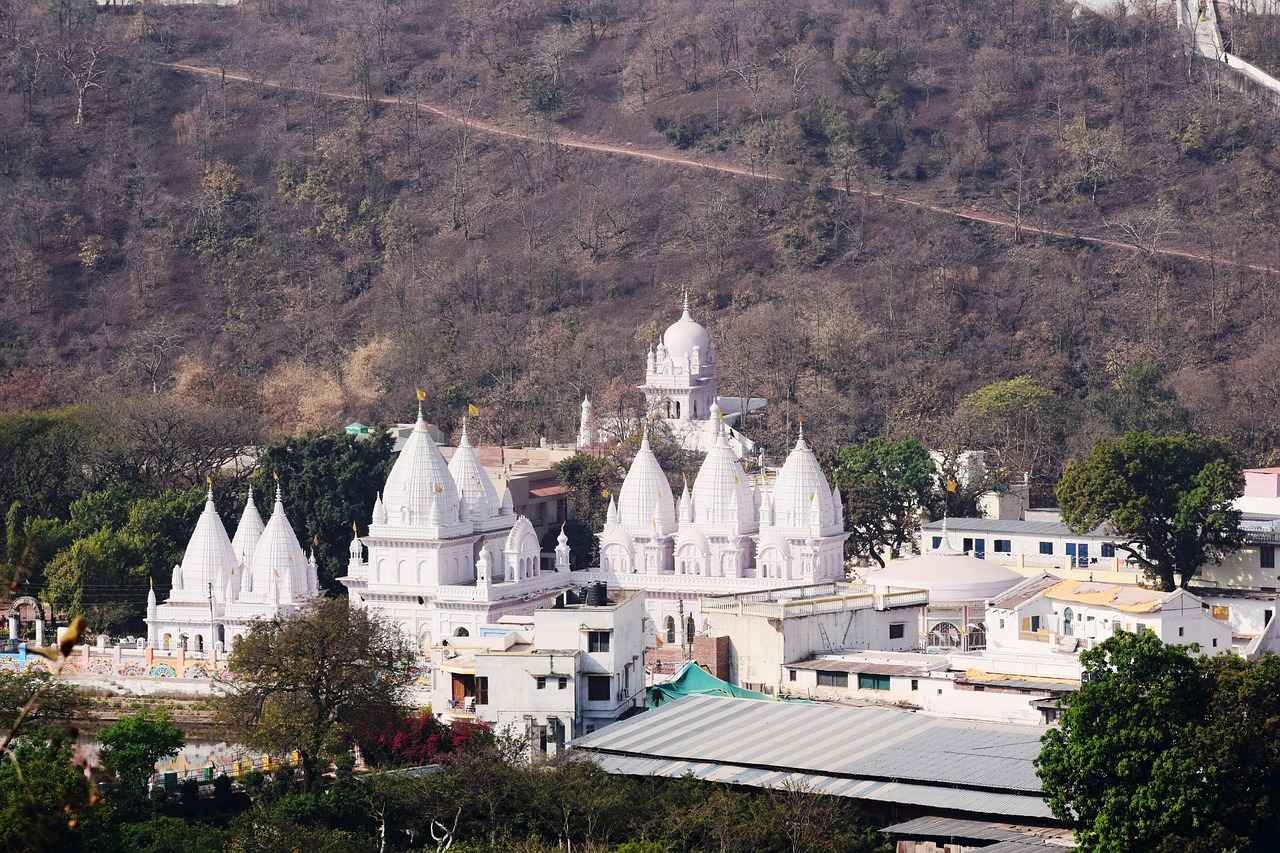This article delves into the profound significance of Mahavir Jayanti, highlighting the various celebrations and events that take place in New York City. It offers valuable insights into the rich traditions of the Jain community, showcasing their vibrant culture and the importance of this festival.
What is Mahavir Jayanti?
Mahavir Jayanti commemorates the birth of Lord Mahavir, the 24th Tirthankara of Jainism, who is revered for his teachings on non-violence, truth, and asceticism. Celebrated with great fervor, this festival not only marks a pivotal moment in Jain history but also serves as a reminder of the core values that underpin Jain philosophy. The date of Mahavir Jayanti varies each year, typically falling in March or April, depending on the lunar calendar.
Significance of Mahavir Jayanti in Jainism
The significance of Mahavir Jayanti transcends mere celebration; it embodies the essence of Jain teachings. Lord Mahavir’s life and philosophy are centered around the principles of ahimsa (non-violence), satya (truth), and aparigraha (non-possessiveness). This festival serves as a pivotal occasion for Jains to reflect on these teachings and strive to incorporate them into their daily lives. It is a time for spiritual renewal and commitment to the Jain way of life, reminding followers of the importance of compassion and ethical living.
How is Mahavir Jayanti Celebrated in NYC?
In New York City, Mahavir Jayanti is celebrated with a multitude of events that reflect the rich tapestry of Jain culture. Temples across the city organize special prayers and ceremonies, inviting devotees to participate in rituals that honor Lord Mahavir. Cultural programs, including dance performances, music, and theatrical presentations, are also integral to the celebrations, showcasing the artistic talents of the community. These events not only serve to educate attendees about Jain traditions but also foster a sense of unity and belonging among participants.
Religious Observances During Mahavir Jayanti
Religious observances during Mahavir Jayanti are deeply meaningful for the Jain community. Devotees engage in activities such as fasting, prayer, and meditation, reinforcing their commitment to Jain values. Temples host special ceremonies, including pujas (worship rituals) and processions, where devotees express their reverence for Lord Mahavir. These observances not only enhance spiritual connection but also create an atmosphere of peace and reflection, allowing participants to deepen their understanding of Jain teachings.
Community Events and Gatherings
Community gatherings are a vital aspect of Mahavir Jayanti celebrations in NYC. These events bring together Jains from diverse backgrounds, fostering camaraderie and a sense of community. Cultural performances, discussions about Jain philosophy, and shared meals create a festive atmosphere that celebrates the spirit of togetherness. Such gatherings are instrumental in preserving cultural heritage and passing down traditions to younger generations, ensuring that the teachings of Lord Mahavir continue to resonate within the community.
Role of Jain Temples in NYC
Jain temples in NYC play a crucial role in organizing Mahavir Jayanti celebrations. They serve as spiritual hubs where devotees can gather for worship and community engagement. Temples often host a variety of events, from religious ceremonies to cultural programs, providing a space for education and interaction. The leadership of these temples is instrumental in promoting awareness about Jain values and fostering a sense of belonging among community members, making them essential to the celebration of Mahavir Jayanti.
Cultural Programs and Performances
Cultural programs during Mahavir Jayanti are vibrant and diverse, often featuring dance, music, and drama that depict the life and teachings of Lord Mahavir. These performances not only entertain but also educate attendees about Jain history and philosophy. Engaging the audience through artistic expression, these cultural showcases enhance the celebratory atmosphere, allowing participants to connect emotionally with the teachings of Jainism.
Food and Festivities During Mahavir Jayanti
Food is a significant aspect of Mahavir Jayanti celebrations, with vegetarian feasts prepared for community gatherings. This reflects the Jain principle of ahimsa, emphasizing non-violence even in dietary choices. Shared meals during the celebrations foster a sense of community and togetherness, allowing participants to bond over delicious, ethically prepared dishes. The culinary aspect of the festival not only nourishes the body but also enriches the spirit of unity among attendees.
Educational Workshops and Seminars
Many organizations host educational workshops and seminars during Mahavir Jayanti to delve deeper into Jain philosophy, ethics, and practices. These sessions aim to promote awareness and understanding within the community, encouraging participants to explore the relevance of Jain teachings in contemporary society. By engaging in thoughtful discussions and learning opportunities, attendees can gain valuable insights that enhance their spiritual journey.
Involvement of Jain Youth in Celebrations
The involvement of Jain youth is pivotal during Mahavir Jayanti celebrations. Young members of the community often take on leadership roles in organizing events and cultural programs, ensuring that traditions are passed down and adapted for future generations. Their active participation not only fosters a sense of ownership but also encourages the development of leadership skills and community engagement among the youth.
Mahavir Jayanti and Interfaith Dialogues
Mahavir Jayanti serves as an opportunity for interfaith dialogues, where Jains engage with other religious communities to share their beliefs and promote mutual respect. These dialogues foster understanding and collaboration, emphasizing shared values such as compassion and non-violence. By participating in interfaith events, the Jain community contributes to a broader conversation about coexistence and harmony among diverse religious traditions.
Online Celebrations and Virtual Events
In recent years, many celebrations have transitioned online, allowing broader participation through virtual events. This shift has made it easier for individuals who may not be able to attend in person to join the festivities. Virtual celebrations often include live-streamed prayers, cultural performances, and interactive discussions, ensuring that the spirit of Mahavir Jayanti reaches a wider audience.
Challenges Faced by the Jain Community in NYC
Despite the vibrant celebrations, the Jain community in NYC faces challenges such as maintaining cultural identity and engaging the younger generation in traditional practices. As the community grows and diversifies, it becomes increasingly important to find ways to connect with younger members and ensure that the teachings of Lord Mahavir continue to resonate with them.
Future of Mahavir Jayanti Celebrations in NYC
Looking ahead, the future of Mahavir Jayanti celebrations in NYC appears promising. With increasing participation and innovative approaches to engage the community, the festival is likely to continue thriving. Embracing new technologies and adapting to changing social dynamics will be key in preserving the rich traditions of Jainism while ensuring that they remain relevant in contemporary society.
How to Get Involved in Mahavir Jayanti Celebrations?
For those interested in participating in Mahavir Jayanti celebrations, local Jain temples and organizations often welcome volunteers and attendees. Engaging with the community provides opportunities to learn about Jain traditions, participate in events, and contribute to the vibrant celebrations. Whether through volunteering, attending cultural programs, or simply joining in the festivities, everyone can play a part in honoring the legacy of Lord Mahavir.
The spirit of Mahavir Jayanti is about embracing the teachings of Lord Mahavir and fostering a sense of community, making it a significant occasion for Jains in NYC and beyond.

What is Mahavir Jayanti?
Mahavir Jayanti is a significant festival in Jainism, commemorating the birth of Lord Mahavir, the 24th Tirthankara. Lord Mahavir, born in 599 BCE in the city of Vaishali, Bihar, is revered for his profound teachings on non-violence, truth, and asceticism. His life and principles form the foundation of Jain philosophy, making Mahavir Jayanti a day of immense importance for Jains around the globe.
The festival typically falls in March or April, depending on the lunar calendar, and is celebrated with great fervor by the Jain community. It serves as a time for reflection, reverence, and renewal of commitment to the teachings of Lord Mahavir. During this festival, Jains engage in various religious and cultural activities that highlight the core values of Jainism.
One of the central themes of Mahavir Jayanti is the promotion of ahimsa, or non-violence, which is not only a fundamental tenet of Jainism but also a principle that resonates with many people around the world. On this day, devotees often participate in processions that feature the idol of Lord Mahavir, accompanied by chanting and prayers. These processions symbolize the joy and reverence the community feels for their spiritual leader.
In addition to processions, Mahavir Jayanti is marked by various religious observances. Many Jains visit temples to offer prayers, conduct rituals, and listen to discourses on Lord Mahavir’s teachings. These activities provide an opportunity for the community to come together and celebrate their shared beliefs. Temples often organize special events, including meditation sessions and lectures, aimed at deepening the understanding of Jain philosophy and ethics.
The festival also serves as a reminder of the importance of charity and compassion. Many Jains choose to engage in charitable acts during Mahavir Jayanti, such as donating to the less fortunate or participating in community service. This practice reflects the Jain commitment to helping others and living a life of service, which is a key aspect of Lord Mahavir’s teachings.
Moreover, Mahavir Jayanti fosters a sense of unity and camaraderie among Jains. It is a time for friends and families to come together, share meals, and participate in cultural programs that celebrate Jain heritage. These gatherings often include traditional music, dance, and storytelling, which help to keep the community’s rich history alive and vibrant.
In conclusion, Mahavir Jayanti is more than just a celebration of Lord Mahavir’s birth; it is a profound expression of Jain values and a commitment to living a life of non-violence, truth, and compassion. The festival serves as a reminder of the teachings of Lord Mahavir, encouraging Jains to reflect on their beliefs and strengthen their community ties.

Significance of Mahavir Jayanti in Jainism
Mahavir Jayanti is one of the most significant festivals in Jainism, commemorating the birth of Lord Mahavir, the 24th Tirthankara. This festival is not just a celebration of his birth but also a profound reminder of his teachings that emphasize the core principles of Jain philosophy. The observance of Mahavir Jayanti offers an opportunity for Jains worldwide to reflect on the values of non-violence, truth, and asceticism, which are foundational to their beliefs and practices.
During this auspicious occasion, the teachings of Lord Mahavir are brought to the forefront, inspiring followers to embody his principles in their daily lives. The festival serves as a reminder of the importance of living in harmony with all living beings, promoting a lifestyle that is rooted in compassion and understanding. As Jains gather to celebrate, they reaffirm their commitment to these essential values, fostering a sense of unity and purpose within the community.
The significance of Mahavir Jayanti extends beyond mere celebration; it is a time for introspection and spiritual growth. Devotees engage in various religious activities, such as prayers and meditation, to deepen their connection with Lord Mahavir’s teachings. This spiritual engagement allows individuals to reflect on their actions and strive for a more ethical and meaningful existence. In this way, Mahavir Jayanti becomes a catalyst for personal transformation, encouraging Jains to adopt a lifestyle that aligns with the principles of Jainism.
Moreover, the festival highlights the importance of community and collective practice in Jainism. Community gatherings during Mahavir Jayanti foster a sense of belonging and solidarity among Jains, allowing them to share their experiences and reinforce their commitment to Jain values. These gatherings often include cultural programs, discussions, and communal meals, which not only celebrate Lord Mahavir’s teachings but also strengthen social bonds within the community.
In addition to fostering community spirit, Mahavir Jayanti serves as an educational platform. Many temples and organizations organize workshops and seminars to discuss the teachings of Lord Mahavir and their relevance in contemporary society. These educational initiatives aim to promote awareness and understanding of Jain philosophy, ensuring that the teachings of Lord Mahavir continue to resonate with future generations. By engaging in these activities, the Jain community can preserve its rich heritage while adapting to modern challenges.
Furthermore, Mahavir Jayanti has become an occasion for interfaith dialogue, where Jains engage with individuals from other religious backgrounds to share their beliefs and promote mutual respect. This openness to dialogue reflects the essence of Lord Mahavir’s teachings, which advocate for understanding and harmony among diverse communities. Such interactions not only enrich the Jain community but also contribute to a more peaceful and inclusive society.
In summary, the significance of Mahavir Jayanti in Jainism extends far beyond the celebration of Lord Mahavir’s birth. It serves as a powerful reminder of the core values of non-violence, truth, and asceticism that guide the lives of Jains. Through religious observances, community gatherings, educational initiatives, and interfaith dialogues, Mahavir Jayanti reinforces the principles of Jain philosophy, fostering a spirit of unity and commitment among followers. As Jains around the world come together to celebrate this important festival, they not only honor their spiritual leader but also reaffirm their dedication to living a life of compassion and integrity.

How is Mahavir Jayanti Celebrated in NYC?
Mahavir Jayanti is a significant festival for the Jain community, celebrating the birth of Lord Mahavir, the 24th Tirthankara. In New York City, this vibrant festival is marked by a variety of events that reflect the rich traditions and culture of Jainism. The celebrations not only bring the community together but also serve as a platform to share the teachings of Lord Mahavir with a broader audience.
In New York City, the celebrations of Mahavir Jayanti are a blend of religious observance, cultural expression, and community engagement. The festivities typically span several days and include a myriad of events designed to honor the teachings of Lord Mahavir and foster a sense of unity among Jains.
- Religious Ceremonies: The celebrations often begin with special prayers and rituals at local Jain temples. Devotees gather to participate in pujas (worship) and listen to discourses on the life and teachings of Lord Mahavir. These ceremonies are characterized by a deep sense of spirituality and devotion, as attendees reflect on the principles of non-violence and truth that Lord Mahavir espoused.
- Cultural Programs: Cultural events play a significant role in the Mahavir Jayanti celebrations. Various performances, including traditional dances, music, and theatrical presentations, take place in community halls and temples. These programs often depict stories from the life of Lord Mahavir, making the teachings accessible and engaging for all ages.
- Community Gatherings: One of the highlights of Mahavir Jayanti in NYC is the community gatherings, where Jains come together to celebrate with shared meals and fellowship. These gatherings not only strengthen community bonds but also provide an opportunity for attendees to engage in discussions about Jain philosophy and ethics.
- Food and Festivities: Food is an integral part of the celebrations, with elaborate vegetarian feasts prepared in accordance with Jain dietary principles. These meals are often enjoyed in a communal setting, fostering a spirit of togetherness and sharing.
- Educational Initiatives: In addition to cultural and religious activities, many organizations take the opportunity to host workshops and seminars during Mahavir Jayanti. These sessions aim to educate both the Jain community and the public about Jainism, its values, and its practices. Topics may include discussions on non-violence, environmental conservation, and ethical living, which resonate with a wider audience.
Furthermore, in recent years, the celebrations have adapted to include virtual events, allowing participation from those who may not be able to attend in person. Online platforms enable a broader reach, ensuring that the teachings and celebrations of Mahavir Jayanti can be shared with a global audience.
The involvement of Jain youth is also crucial during these celebrations. Young members of the community often take on leadership roles in organizing events and cultural programs, ensuring that the traditions are preserved and passed down to future generations. Their participation not only brings fresh perspectives but also encourages a sense of responsibility and engagement within the community.
Overall, Mahavir Jayanti in New York City is a vibrant celebration that encapsulates the essence of Jainism. Through a combination of religious observance, cultural expression, and community engagement, the festival serves as a reminder of the enduring teachings of Lord Mahavir and the importance of living a life grounded in compassion and truth.

Religious Observances During Mahavir Jayanti
Mahavir Jayanti is a significant festival in Jainism, celebrated with profound reverence and devotion. The day commemorates the birth of Lord Mahavir, the 24th Tirthankara, who is revered for his teachings on non-violence, truth, and asceticism. During this auspicious occasion, Jains around the world engage in various religious observances that reinforce their commitment to Jain values and principles.
One of the primary activities during Mahavir Jayanti is prayer. Devotees gather at temples and homes to offer prayers, recite sacred texts, and chant mantras dedicated to Lord Mahavir. These prayers are not only a form of worship but also serve to cultivate a sense of inner peace and spiritual connection among the participants. Many devotees also engage in meditation, which is a core practice in Jainism. Meditation allows individuals to reflect on the teachings of Lord Mahavir, fostering a deeper understanding of the principles of non-violence and self-discipline.
Another important aspect of the observances is fasting. Many Jains choose to fast on Mahavir Jayanti as a form of penance and a means to purify the body and mind. Fasting can take various forms, from abstaining from food and water to consuming only specific types of food. This practice is deeply rooted in the Jain philosophy of ahimsa (non-violence) and is seen as a way to demonstrate commitment to spiritual growth and self-control. The act of fasting is often accompanied by increased prayer and meditation, enhancing the overall spiritual experience of the festival.
Temples play a central role in the religious observances of Mahavir Jayanti. They are adorned with flowers and decorations, creating a festive atmosphere for devotees. Special ceremonies and rituals are held, including the abhishek (ritual bathing) of the idol of Lord Mahavir, which symbolizes purification and respect. These ceremonies often involve the participation of the community, fostering a sense of unity and collective devotion. In many temples, the day concludes with a community prayer session, where devotees come together to reflect on the teachings of Lord Mahavir and to seek blessings for peace and prosperity.
In addition to traditional prayers and rituals, many Jain communities organize educational sessions and discussions during Mahavir Jayanti. These gatherings provide a platform for individuals to learn more about Jain philosophy, ethics, and the life of Lord Mahavir. Such initiatives are particularly important for younger generations, as they help to instill a sense of identity and belonging within the community.
Overall, the religious observances during Mahavir Jayanti are a profound expression of faith and commitment among Jains. Through prayers, fasting, meditation, and community engagement, devotees celebrate the teachings of Lord Mahavir while reinforcing their dedication to the core values of Jainism. These observances not only honor the legacy of Lord Mahavir but also serve to strengthen the bonds within the Jain community, making Mahavir Jayanti a truly meaningful occasion.

Community Events and Gatherings
During Mahavir Jayanti, community events and gatherings are pivotal in celebrating the teachings and legacy of Lord Mahavir. These gatherings not only serve as a platform for cultural expression but also strengthen the bonds among community members, fostering a deep sense of belonging and unity. In cities like New York, where the Jain community is vibrant yet diverse, these events play a crucial role in maintaining cultural heritage and promoting Jain values.
One of the most significant aspects of these gatherings is the cultural performances. Jains come together to showcase their rich traditions through music, dance, and drama, often depicting stories from the life of Lord Mahavir. Such performances not only entertain but also educate attendees about Jain principles and history. For instance, local artists may perform traditional dances that narrate the journey of Lord Mahavir, emphasizing his teachings of ahimsa (non-violence) and samyak darshan (right perception).
Moreover, community discussions during these events provide an opportunity for members to engage in meaningful conversations about Jain philosophy and contemporary issues affecting the community. These discussions often include topics such as the importance of environmental sustainability, ethical living, and the role of Jainism in modern society. By sharing insights and experiences, participants can deepen their understanding of Jain teachings and how they apply to everyday life.
Shared meals are another essential component of these gatherings. The community often comes together to enjoy a vegetarian feast, reflecting the Jain principle of non-violence in dietary choices. These meals not only nourish the body but also create an atmosphere of camaraderie and friendship, reinforcing the idea that food brings people together. Typically, these feasts are prepared by volunteers from the community, showcasing a variety of traditional Jain dishes that celebrate the diversity of Jain cuisine.
In addition to cultural performances and discussions, many community events incorporate educational workshops. These workshops may focus on various aspects of Jainism, including meditation, ethical living, and the significance of festivals. By participating in these workshops, attendees can gain a deeper appreciation for their faith and the values it promotes. Furthermore, these educational initiatives help engage younger generations, ensuring that the teachings of Lord Mahavir continue to resonate with future community members.
Another important aspect of community gatherings during Mahavir Jayanti is the involvement of youth and families. Young members of the community often take on leadership roles in organizing events and activities, fostering a sense of responsibility and connection to their heritage. Families are encouraged to participate together, creating a multi-generational environment where traditions are passed down and shared. This inclusive approach not only strengthens family bonds but also cultivates a sense of pride in Jain identity.
In conclusion, community events and gatherings during Mahavir Jayanti serve as a vital expression of Jain culture and values. They provide a platform for celebration, education, and connection, allowing members of the Jain community in NYC to come together in unity and shared purpose. As these gatherings continue to evolve, they will undoubtedly play an essential role in preserving the rich traditions of Jainism while adapting to the needs of contemporary society.

Role of Jain Temples in NYC
Jain temples in New York City are not just places of worship; they are vibrant hubs of community life and spiritual engagement. As the center of Mahavir Jayanti celebrations, these temples play a pivotal role in fostering a sense of belonging among Jains in the region. The temples not only provide a sacred space for rituals and prayers but also serve as venues for various cultural and educational activities that enrich the lives of community members.
One of the primary functions of Jain temples during Mahavir Jayanti is to organize a myriad of events that cater to the spiritual needs of the community. These events often include special prayer services, where devotees gather to pay homage to Lord Mahavir. The temples are adorned with flowers and lights, creating an atmosphere of reverence and celebration. Community members actively participate in these services, which may include recitations of sacred texts, singing of devotional songs, and meditation sessions, all aimed at deepening their spiritual connection.
Furthermore, Jain temples in NYC take the initiative to host cultural programs that highlight the rich traditions of Jainism. These programs often feature dance performances, theatrical representations of Jain stories, and educational talks that elucidate the teachings of Lord Mahavir. Such activities not only entertain but also educate attendees about the core values of Jain philosophy, including ahimsa (non-violence), truthfulness, and compassion.
In addition to spiritual and cultural activities, Jain temples serve as venues for community gatherings, which are essential for fostering unity and cooperation among members. During Mahavir Jayanti, the temples often organize communal meals, known as langar, where devotees share vegetarian food, reflecting the Jain principle of non-violence in dietary choices. These meals not only nourish the body but also strengthen social bonds within the community.
The role of Jain temples extends beyond mere celebrations; they also act as educational centers. Many temples offer workshops and seminars that delve into Jain philosophy, ethics, and practices. These educational initiatives are crucial for engaging younger generations, ensuring they understand their heritage and the significance of their beliefs. By involving youth in the planning and execution of events, temples empower them to take an active role in preserving their culture and traditions.
Moreover, Jain temples in NYC are increasingly embracing technology to reach a wider audience. With the rise of virtual events, many temples have adapted their Mahavir Jayanti celebrations to include online participation, allowing Jains from around the world to join in the festivities. This shift not only enhances accessibility but also promotes a global sense of community among Jains.
In conclusion, the role of Jain temples in NYC during Mahavir Jayanti is multifaceted. They serve as spiritual sanctuaries, cultural hubs, and educational institutions, all while fostering a strong sense of community among Jains. Through their various initiatives, these temples ensure that the teachings of Lord Mahavir continue to resonate within the community, making Mahavir Jayanti a truly enriching experience for all.

Cultural Programs and Performances
During Mahavir Jayanti, cultural programs and performances play a vital role in celebrating the life and teachings of Lord Mahavir. These events not only serve as a form of entertainment but also as a medium for education, allowing attendees to engage with Jain principles in a dynamic and interactive manner. The rich tapestry of cultural expressions, including dance, music, and drama, creates an immersive experience that enhances the festive atmosphere.
One of the most captivating aspects of these cultural programs is the variety of dance performances that are staged during the celebrations. Traditional dances often depict stories from the life of Lord Mahavir, illustrating his teachings on non-violence, compassion, and truth. These performances not only entertain but also educate the audience about Jain values and the significance of Lord Mahavir’s message. Local dance troupes, often comprised of community members, rehearse for weeks to ensure that their performances convey the essence of Jain philosophy while also captivating the audience with their artistic expression.
In addition to dance, musical performances are integral to Mahavir Jayanti celebrations. Instrumental music, vocal renditions, and even contemporary adaptations of traditional Jain hymns fill the air with a sense of reverence and joy. Musicians often collaborate with dancers to create a harmonious blend of sound and movement, making the experience even more enriching. The melodies and rhythms resonate with the audience, fostering a deeper connection to the teachings of Lord Mahavir and the values of Jainism.
Drama and theatrical presentations also hold a significant place in the cultural programs during Mahavir Jayanti. These performances often take the form of skits or full-length plays that narrate episodes from Lord Mahavir’s life, highlighting pivotal moments that shaped his teachings. Through dialogue and characterization, these dramatizations bring to life the principles of Jainism, such as the importance of ahimsa (non-violence) and satya (truth). The theatrical performances invite audience participation, making the experience more engaging and thought-provoking.
Moreover, these cultural programs foster a sense of community among Jains in New York City. They provide a platform for individuals of all ages to come together, celebrate their heritage, and share their talents. The collaborative nature of these events encourages community bonding and strengthens the cultural identity of the Jain community in a multicultural setting.
The inclusion of interactive workshops during these cultural programs is another innovative approach. Participants can engage in activities such as learning traditional dance steps or musical instruments, allowing them to connect with their culture on a personal level. These workshops not only promote cultural preservation but also empower the younger generation to take an active role in their community’s celebrations.
In conclusion, cultural programs and performances during Mahavir Jayanti are a vibrant expression of Jain traditions. They serve as a powerful reminder of the teachings of Lord Mahavir, while also fostering community spirit and cultural continuity. Through dance, music, and drama, the essence of Jainism is celebrated, ensuring that the values of compassion, truth, and non-violence resonate with both current and future generations.

Food and Festivities During Mahavir Jayanti
During Mahavir Jayanti, food is not merely a source of sustenance; it embodies a deep cultural significance that resonates with the core principles of Jainism. The festival, which celebrates the birth of Lord Mahavir, the 24th Tirthankara, is marked by a strong emphasis on ahimsa (non-violence), and this philosophy profoundly influences the dietary choices made during the celebrations.
In Jain communities, particularly in New York City, the preparation of vegetarian feasts is a central aspect of the Mahavir Jayanti celebrations. These feasts are meticulously planned to ensure that they align with the principles of Jainism. Traditionally, the meals consist of a variety of dishes made from fresh, locally sourced vegetables, grains, and legumes, all prepared with love and care. This dedication not only highlights the importance of vegetarianism but also reflects the community’s commitment to non-violence, as no harm comes to any living being during the preparation of these meals.
Among the popular dishes served during these gatherings are dal (lentil curry), sabzi (vegetable dishes), and rice, accompanied by rotis (Indian bread) and a selection of sweets made from natural ingredients. These meals are often prepared in large quantities, symbolizing abundance and the spirit of sharing. The act of sharing food with family and friends fosters a sense of unity and strengthens community bonds.
- Importance of Community Feasts: Community feasts play a crucial role in the celebrations, bringing together individuals from diverse backgrounds to partake in the joyous occasion. These gatherings are often held in local Jain temples or community centers, where individuals come together to prepare and share meals, reinforcing the values of cooperation and togetherness.
- Reflection of Jain Values: The vegetarian feasts serve as a representation of Jain values, particularly the principle of ahimsa. By choosing to abstain from meat and animal products, the community actively promotes a lifestyle that minimizes harm to living beings, aligning their dietary choices with their spiritual beliefs.
- Inclusivity in Celebrations: The feasts are designed to be inclusive, welcoming not only Jains but also individuals from other faiths and backgrounds. This openness encourages dialogue and understanding, allowing for a richer cultural exchange during the celebrations.
As part of the festivities, many families also engage in the tradition of offering food to the less fortunate, embodying the Jain tenet of charity and compassion. This practice not only provides nourishment to those in need but also serves as a reminder of the importance of selflessness and community service.
In addition to the vegetarian feasts, various cultural programs are organized alongside the meals, including traditional music and dance performances that celebrate Jain heritage. These activities enhance the festive atmosphere, allowing participants to immerse themselves fully in the cultural richness of the occasion.
As Mahavir Jayanti approaches, the anticipation of these communal meals and celebrations grows, reflecting the deep-rooted traditions of the Jain community. The feasts are not only a means of nourishment but also a celebration of life, unity, and the enduring teachings of Lord Mahavir.

Educational Workshops and Seminars
During Mahavir Jayanti, the Jain community actively engages in a variety of educational workshops and seminars aimed at fostering a deeper understanding of Jain philosophy, ethics, and practices. These gatherings serve as a platform for both seasoned practitioners and newcomers to explore the rich teachings of Lord Mahavir, the 24th Tirthankara, whose life exemplifies the principles of non-violence, truth, and compassion.
Educational workshops and seminars during Mahavir Jayanti play a pivotal role in promoting Jain values and principles. They provide an opportunity for community members to engage in meaningful discussions about ethical living, the significance of ahimsa (non-violence), and the importance of spiritual growth. These sessions often feature esteemed speakers, including scholars and spiritual leaders, who share insights into the practical applications of Jain teachings in modern life.
- Jain Philosophy: Exploring the core tenets of Jainism, including the concepts of karma, moksha, and the path of right knowledge, right faith, and right conduct.
- Ethics in Daily Life: Discussions on how to implement Jain ethics in daily activities, emphasizing the importance of honesty, integrity, and respect for all living beings.
- Environmental Awareness: Workshops that highlight Jainism’s connection to environmental sustainability and the ethical treatment of animals, reinforcing the principle of ahimsa.
- Meditation and Mindfulness: Practical sessions on meditation techniques, helping participants cultivate inner peace and awareness, which are essential in Jain practice.
These workshops often incorporate interactive elements such as group discussions, role-playing, and case studies that allow participants to apply what they learn in real-world scenarios. This approach not only enhances understanding but also encourages participants to share their experiences and perspectives, fostering a sense of community and collaboration.
The workshops are designed for a diverse audience, including:
- Jain Youth: Young adults and teenagers are encouraged to participate, ensuring the transmission of Jain values to future generations.
- Newcomers: Individuals new to Jainism are welcomed to learn about the faith in a supportive environment.
- Families: Family-oriented sessions are organized to facilitate discussions on how to incorporate Jain principles into family life.
Many Jain organizations collaborate with educational institutions to host these workshops, thereby extending their reach beyond the immediate community. By partnering with schools and universities, they aim to raise awareness about Jainism among a broader audience, fostering interfaith understanding and respect.
Feedback from participants is actively sought to improve future workshops. This iterative process ensures that the content remains relevant and engaging, catering to the evolving needs of the community. Many attendees express appreciation for the opportunity to learn and engage with others who share their values and beliefs.
In summary, the educational workshops and seminars held during Mahavir Jayanti are not just about imparting knowledge; they are about building a stronger, more informed Jain community. By promoting understanding and dialogue, these events help to ensure that the teachings of Lord Mahavir continue to inspire and guide individuals in their daily lives.

Involvement of Jain Youth in Celebrations
The participation of Jain youth in celebrations, particularly during significant events like Mahavir Jayanti, is not only crucial for the preservation of cultural heritage but also serves as a platform for young individuals to develop essential life skills. As they engage in organizing various activities, these young members of the Jain community play a pivotal role in ensuring that the rich traditions of Jainism are handed down to future generations.
Involvement in community events provides Jain youth with opportunities to cultivate leadership skills. By taking charge of organizing cultural programs, they learn to manage resources, coordinate with various stakeholders, and execute plans effectively. This hands-on experience is invaluable, as it equips them with skills that are applicable in both personal and professional realms. For instance, organizing a large-scale event requires teamwork, communication, and problem-solving abilities, all of which are essential in today’s fast-paced world.
The active participation of young Jains in celebrations ensures that the traditions and customs of their community are preserved. Through events such as Mahavir Jayanti, youth are involved in activities that highlight the teachings of Lord Mahavir, including non-violence, compassion, and truthfulness. By engaging in cultural performances, discussions, and workshops, they not only learn about their heritage but also become ambassadors of these values in wider society.
Jain youth often serve as a bridge between the older and younger generations within their community. Their involvement in organizing events fosters a sense of community and belonging. They can initiate discussions on contemporary issues facing the Jain community, encouraging dialogues that involve both young and older members. This engagement is crucial for maintaining a cohesive community identity, especially in multicultural urban settings like New York City.
With their fresh perspectives, Jain youth are instrumental in creating innovative cultural programs that resonate with younger audiences. They often incorporate modern elements into traditional celebrations, making them more appealing and relevant. For example, using social media to promote events or integrating technology into performances can attract a diverse audience, ensuring that the vibrancy of Jain culture is showcased effectively.
Participation in celebrations also allows Jain youth to build networks and friendships that can last a lifetime. These connections are vital for personal growth and can lead to collaborative projects that benefit the community. By working together on events, they learn the importance of teamwork and mutual support, fostering a spirit of camaraderie that strengthens their bonds.
Involvement in organizing events often inspires Jain youth to engage in volunteerism and philanthropy. They learn the significance of giving back to the community, whether through organizing charity events or participating in service projects. This sense of responsibility not only enriches their lives but also positively impacts the broader society, embodying the Jain principle of ahimsa (non-violence) in action.
In conclusion, the involvement of Jain youth in celebrations is multifaceted and essential for the growth and sustainability of the Jain community. Through their active participation, they not only preserve cultural traditions but also develop vital skills that prepare them for future challenges. Their role in fostering community engagement, innovation, and social responsibility is invaluable, making them key players in the ongoing legacy of Jainism.

Mahavir Jayanti and Interfaith Dialogues
Mahavir Jayanti is not only a time for celebration among the Jain community but also a significant occasion that fosters interfaith dialogues. This aspect of the festival allows Jains to engage with individuals from various religious backgrounds, promoting a spirit of mutual respect and understanding. As the world becomes increasingly interconnected, such dialogues are essential in addressing misconceptions and building bridges between different faiths.
Interfaith dialogues during Mahavir Jayanti are crucial for several reasons. First, they provide a platform for Jains to articulate their beliefs and practices, helping others to understand the core tenets of Jainism, such as non-violence, truthfulness, and asceticism. By sharing these principles, Jains can illuminate the common values that many religions uphold, fostering a sense of shared humanity.
Moreover, these dialogues encourage participants to reflect on their own beliefs and practices. Engaging with different perspectives can lead to personal growth and a deeper appreciation for one’s faith. This exchange of ideas creates a rich tapestry of understanding, which is particularly important in today’s diverse society.
During Mahavir Jayanti, various interfaith events are organized in cities like New York, where the Jain community is vibrant and diverse. These events typically include panel discussions, workshops, and community service activities. Inviting leaders and representatives from different faiths to speak about their traditions and values can create an enriching environment for dialogue.
- Panel Discussions: These forums allow for open dialogue on various topics, such as the importance of peace and compassion in all religions.
- Workshops: Interactive sessions can help participants learn about Jain practices, such as meditation and fasting, and how these practices contribute to a peaceful society.
- Community Service: Engaging in service projects together fosters camaraderie and demonstrates the shared commitment to helping others.
The benefits of engaging in interfaith dialogues during Mahavir Jayanti extend beyond the immediate community. They contribute to a broader understanding and acceptance of diversity in society. Through these interactions, misconceptions about Jainism and other religions can be addressed, reducing prejudice and promoting harmony.
Additionally, these dialogues can inspire collaborative efforts in addressing social issues. For instance, by uniting different faith communities to work on initiatives such as environmental sustainability or social justice, participants can leverage their diverse perspectives to create impactful solutions.
Despite the positive aspects, fostering interfaith dialogues during Mahavir Jayanti does come with challenges. One significant hurdle is overcoming preconceived notions and biases that individuals may hold about other religions. It requires patience and a willingness to listen and learn from one another.
Furthermore, logistical challenges may arise in organizing events, such as finding suitable venues that can accommodate diverse groups and ensuring that discussions remain respectful and constructive. However, with careful planning and a commitment to open communication, these challenges can be surmounted.
Looking ahead, the role of interfaith dialogues during Mahavir Jayanti is likely to grow. As the Jain community continues to expand globally, the need for understanding and cooperation among different faiths will become increasingly important. By embracing this opportunity, Jains can contribute to a more peaceful and harmonious world.
In conclusion, Mahavir Jayanti serves as a vital occasion for interfaith dialogues, enabling the Jain community to share their beliefs, foster understanding, and promote mutual respect among diverse religious groups. As these dialogues continue to evolve, they hold the potential to create lasting connections and enrich the spiritual landscape of our society.

Online Celebrations and Virtual Events
In recent years, the landscape of celebrations has evolved significantly, particularly with the rise of digital technology. Events that once required physical presence have transitioned to online platforms, allowing for a more inclusive and accessible experience. This trend has been especially noticeable during significant festivals such as Mahavir Jayanti, where the Jain community has embraced virtual events to ensure that everyone can participate, regardless of their geographical location or personal circumstances.
As the world becomes increasingly interconnected through technology, online celebrations have emerged as a vital alternative for many communities, including the Jain community during Mahavir Jayanti. These virtual events provide opportunities for individuals who may be unable to attend in person due to distance, health issues, or other commitments to engage in the festivities. The transition to online platforms has not only broadened participation but has also enriched the overall experience of the celebrations.
- Accessibility: One of the most significant advantages of online celebrations is the enhanced accessibility they offer. Individuals from diverse backgrounds can join the festivities from the comfort of their homes, ensuring that no one feels excluded from the joyous occasion.
- Global Participation: Virtual events allow for participation from Jains across the globe, fostering a sense of unity and shared purpose. People from different countries can come together to celebrate Mahavir Jayanti, sharing their traditions and experiences.
- Interactive Features: Many online platforms provide interactive features such as live chats, Q&A sessions, and virtual breakout rooms. These tools enable participants to engage actively with one another, creating a sense of community even in a digital environment.
- Cultural Preservation: Online events allow for the preservation of Jain culture and traditions through digital storytelling, performances, and presentations that can be shared widely. This helps educate younger generations about their heritage.
Moreover, the flexibility of online events means that they can be tailored to accommodate various time zones, making it easier for international participants to join. For instance, live-streamed prayers and ceremonies can be scheduled at different times to ensure maximum attendance. This adaptability is a game-changer for festivals like Mahavir Jayanti, where participation is key to the celebration.
However, organizing online celebrations does come with its challenges. Technical issues can arise, and not all community members may have equal access to the necessary technology or internet connectivity. To address these challenges, many organizations have implemented training sessions to help individuals navigate online platforms and ensure that everyone can participate effectively.
In addition to live events, recorded sessions and highlights of the celebrations can be shared on social media and community websites, allowing those who could not attend live to experience the festivities later. This aspect of online celebrations enhances the reach and impact of Mahavir Jayanti, making it a truly global event.
Ultimately, the shift to online celebrations has proven to be a significant development in how communities engage during important festivals. It has opened new avenues for connection, understanding, and celebration, ensuring that the spirit of Mahavir Jayanti continues to thrive, even in challenging times. As technology continues to evolve, it is likely that the integration of virtual events will remain a prominent feature of future celebrations.

Challenges Faced by the Jain Community in NYC
The Jain community in New York City is known for its vibrant celebrations and rich traditions, particularly during festivals like Mahavir Jayanti. However, alongside these joyous occasions, the community grapples with significant challenges that threaten its cultural identity and the engagement of younger generations in traditional practices.
Maintaining Cultural Identity
One of the primary challenges is the struggle to maintain a distinct cultural identity amidst the diverse tapestry of New York City. As a melting pot of various cultures and religions, the Jain community often finds itself at risk of dilution. The fast-paced lifestyle and the emphasis on assimilation into the broader American culture can lead to a gradual erosion of traditional values and practices. Many Jains express concern that the younger generation is becoming increasingly disconnected from their roots, as they navigate a society that often prioritizes mainstream cultural norms over the unique customs and rituals of their heritage.
To address this issue, community leaders and organizations are actively working to create a supportive environment that fosters cultural pride. Initiatives such as cultural workshops, language classes, and storytelling sessions are being implemented to educate younger Jains about their heritage. By immersing youth in their cultural practices, the community aims to instill a sense of belonging and identity that transcends the challenges posed by external influences.
Engaging the Younger Generation
Another pressing challenge is engaging the younger generation in traditional Jain practices. Many young Jains find themselves torn between their cultural heritage and the allure of modern lifestyles. The increasing prevalence of technology and social media has also contributed to a shift in interests, with many young people gravitating towards activities that may not align with traditional Jain values.
To combat this trend, the community is exploring innovative ways to make traditional practices more appealing to youth. For instance, integrating technology into community events—such as virtual reality experiences that showcase Jain history or interactive apps that teach Jain philosophy—can help bridge the gap between tradition and modernity. Additionally, involving youth in the planning and execution of events can empower them and provide a sense of ownership over their cultural practices.
Building Community Connections
The Jain community in NYC also faces the challenge of fostering connections among its members. As urban lifestyles often lead to isolation, creating a strong sense of community is vital for preserving cultural practices. Community gatherings, festivals, and social events serve as crucial platforms for building relationships and fostering a collective identity. However, participation can sometimes be low due to busy schedules and competing commitments.
To enhance community engagement, leaders are focusing on creating inclusive environments that cater to various interests and age groups. Family-friendly events that incorporate fun activities, such as cultural games and interactive performances, can attract more participants. Furthermore, addressing the needs of diverse sub-groups within the Jain community—such as young professionals, families, and seniors—can help tailor events that resonate with different demographics.
Overcoming Financial Constraints
Financial constraints also pose a significant challenge for the Jain community in NYC. Organizing events, maintaining temples, and supporting community initiatives require substantial resources. Many community organizations rely on donations and volunteer efforts, which can fluctuate based on economic conditions. This uncertainty can hinder the planning of large-scale events or outreach programs aimed at preserving cultural practices.
To mitigate these financial challenges, the community is exploring various fundraising strategies, including crowdfunding campaigns, partnerships with local businesses, and grant applications. By diversifying funding sources, the Jain community can ensure the sustainability of its cultural programs and events.
Conclusion
In conclusion, while the Jain community in NYC faces significant challenges in maintaining cultural identity and engaging the younger generation, there are concerted efforts underway to address these issues. Through innovative approaches, community involvement, and financial planning, the Jain community can work towards preserving its rich heritage while adapting to the modern world. The journey may be complex, but the resilience of the community is a testament to its commitment to keeping traditions alive.

Future of Mahavir Jayanti Celebrations in NYC
The future of Mahavir Jayanti celebrations in New York City is poised to be vibrant and dynamic, reflecting the evolving landscape of the Jain community. As the population of Jains in NYC continues to grow, the celebrations are expected to expand in both participation and creativity. This evolution is not only about maintaining traditions but also about adapting to contemporary societal changes and the needs of younger generations.
One of the most promising aspects of these future celebrations is the increasing participation from diverse age groups within the Jain community. With a significant number of young Jains taking an active role in organizing events, there is a renewed energy in how Mahavir Jayanti is celebrated. These young leaders are utilizing modern tools and platforms to engage their peers, ensuring that the essence of the festival is communicated effectively. This engagement includes leveraging social media to promote events, share stories, and create a sense of community, making the celebrations more accessible and appealing to younger audiences.
Moreover, innovative approaches to celebrate Mahavir Jayanti are emerging. For instance, incorporating technology into the festivities has allowed for virtual participation, especially during times when physical gatherings may be limited. Online events, such as live-streamed prayers and cultural performances, have made it possible for Jains from different parts of the world to join in the celebrations, fostering a sense of global community. This trend is likely to continue, as technology becomes an integral part of how communities connect and celebrate.
In addition to technology, there is a growing emphasis on cultural diversity within the celebrations. As the Jain community in NYC becomes more multicultural, there is a push to incorporate elements from various cultures into Mahavir Jayanti events. This could include diverse culinary offerings, artistic performances, and collaborative events with other faith communities, promoting interfaith dialogue and understanding. Such inclusivity not only enriches the celebrations but also strengthens community bonds.
Furthermore, educational initiatives are expected to play a crucial role in the future of Mahavir Jayanti celebrations. Workshops and seminars that delve into the teachings of Lord Mahavir and Jain philosophy can provide deeper insights into the significance of the festival. By fostering a greater understanding of Jain principles, these educational efforts can inspire attendees to actively participate in the celebrations and carry forward the teachings of non-violence, truth, and compassion.
The role of Jain temples in NYC will continue to be pivotal in shaping the future of Mahavir Jayanti. These temples serve as community hubs, offering not only spiritual guidance but also a space for cultural exchange and social interaction. As they adapt to the changing needs of the community, temples may introduce new programs and events that cater to the interests of younger generations, ensuring that the celebrations remain relevant and engaging.
In conclusion, the future of Mahavir Jayanti celebrations in New York City is bright, marked by increased participation, innovative approaches, and a commitment to preserving traditions while embracing change. As the Jain community continues to evolve, these celebrations will undoubtedly reflect the rich tapestry of experiences and values that define the community, ensuring that the spirit of Mahavir Jayanti remains alive and vibrant for generations to come.

How to Get Involved in Mahavir Jayanti Celebrations?
Mahavir Jayanti is a significant festival for the Jain community, celebrating the birth of Lord Mahavir, the 24th Tirthankara. For those eager to immerse themselves in this vibrant occasion, there are numerous ways to participate and contribute. Local Jain temples and organizations not only welcome attendees but also actively seek volunteers to help facilitate the various events and activities that mark this important day.
Local Jain temples serve as the heart of Mahavir Jayanti celebrations. They organize a range of activities, from religious ceremonies to cultural programs. By volunteering at these temples, individuals can gain a deeper understanding of Jain traditions and practices. Opportunities often include:
- Event Coordination: Assisting in the planning and execution of celebrations, ensuring that everything runs smoothly.
- Decorating the Temple: Helping to prepare the temple with flowers, lights, and other decorations that reflect the festive spirit.
- Community Outreach: Engaging with the local community to invite participation and share the significance of Mahavir Jayanti.
In addition to temple activities, community events play a crucial role in the Mahavir Jayanti celebrations. These gatherings often include cultural performances, discussions, and shared meals, providing a wonderful opportunity for social interaction. Here’s how you can get involved:
- Join Cultural Programs: Many events feature music, dance, and drama that celebrate the life and teachings of Lord Mahavir. Participating in these performances can be a rewarding experience.
- Volunteer for Food Preparation: Food is a vital part of the celebration, and helping to prepare and serve vegetarian meals aligns with the Jain principle of ahimsa (non-violence).
- Engage in Discussions: Many community events include discussions about Jain philosophy and its relevance today. Contributing to these conversations can enhance your understanding and connection to the community.
Several organizations offer educational workshops and seminars during Mahavir Jayanti. These sessions focus on Jain philosophy, ethics, and practices, making them ideal for those looking to deepen their knowledge. Ways to engage include:
- Attend Workshops: Participating in workshops can provide insights into Jain teachings, allowing for personal growth and a better understanding of the faith.
- Facilitate Discussions: If you have knowledge of Jainism, consider leading a discussion or workshop to share your insights with others.
- Promote Awareness: Help spread the word about these educational opportunities through social media or community boards, encouraging others to participate.
The involvement of Jain youth is essential for the continuity of Mahavir Jayanti celebrations. Younger generations often bring fresh perspectives and innovative ideas. Here are ways to connect:
- Join Youth Groups: Many temples have youth groups that organize events and activities. Getting involved can help strengthen your bonds with peers who share similar values.
- Leadership Opportunities: Take on leadership roles within these groups, helping to plan and execute events, which can enhance your organizational skills.
- Mentorship: If you have experience in organizing events, consider mentoring younger members to help them learn the ropes of community engagement.
In conclusion, Mahavir Jayanti offers a multitude of opportunities for involvement, whether through volunteering at local temples, participating in community events, engaging in educational workshops, or connecting with Jain youth. By actively participating, individuals can not only celebrate this important festival but also contribute to the preservation and promotion of Jain traditions within their communities.

Conclusion: Embracing the Spirit of Mahavir Jayanti
The essence of Mahavir Jayanti transcends mere celebration; it is a profound opportunity for the Jain community to reflect on the teachings of Lord Mahavir and to strengthen communal bonds. This festival, which marks the birth of the 24th Tirthankara of Jainism, encourages individuals to embrace the core values of non-violence, truth, and compassion. These principles are not only central to Jain philosophy but also serve as a guiding light for individuals seeking to navigate the complexities of modern life.
In New York City, the observance of Mahavir Jayanti is a vibrant tapestry woven from various cultural threads. The celebrations often begin with prayers and rituals in local Jain temples, where devotees gather to honor Lord Mahavir. These gatherings foster a sense of belonging and unity among community members, reinforcing the importance of togetherness in spiritual practices. The temples act as sanctuaries where individuals can engage in meditation and reflection, providing a much-needed respite from the hustle and bustle of city life.
Moreover, the festival encourages community involvement through various events that showcase Jain culture. From cultural performances to educational workshops, each event is designed to engage participants of all ages. The younger generation plays a crucial role in these celebrations, often taking the lead in organizing activities that promote awareness of Jain values. This involvement not only empowers youth but also ensures that the rich traditions of Jainism are passed down through generations.
Food is another essential aspect of Mahavir Jayanti celebrations. The preparation of vegetarian feasts reflects the Jain principle of ahimsa, or non-violence, in dietary choices. Community members come together to share meals, fostering a spirit of camaraderie and mutual respect. These gatherings provide an opportunity for individuals to connect, share stories, and deepen their understanding of Jain ethics.
The significance of Mahavir Jayanti extends beyond the confines of the Jain community. It serves as a platform for interfaith dialogues, where Jains engage with individuals from different religious backgrounds to share their beliefs and practices. This exchange promotes mutual respect and understanding, highlighting the importance of coexistence in a diverse society.
As we look towards the future, the celebrations of Mahavir Jayanti in NYC are likely to evolve, embracing new technologies and innovative approaches to engage the community. The shift towards online celebrations in recent years has broadened participation, allowing individuals who may not be able to attend in person to join in the festivities. This adaptability reflects the resilience of the Jain community and its commitment to preserving its rich heritage.
In conclusion, Mahavir Jayanti is not just a festival; it is a celebration of life, values, and community. By embracing the teachings of Lord Mahavir, individuals can cultivate a deeper sense of purpose and connection, both within themselves and with others. The spirit of this occasion serves as a reminder of the importance of compassion, understanding, and unity in our increasingly fragmented world.














